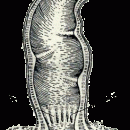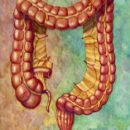Can constipation be a consequence of a family quarrel, and diarrhea - the result of an unpleasant conversation with colleagues? It may be. The thing is that the irritable sink syndrome is the cause of all these symptoms - the disease is not only gastroenterological, but also psychological. How to calm the irritated intestines?
Content
What «irritable intestinal syndrome»?
 Intestinal motor activity is regulated by the central nervous system, hormones and still a number of factors. Irritable bowel syndrome (SRC)– This is, above all, an overly sensitive intestine that is constantly annoyed. In response to stress, the intestinal activity (peristalistic) of the intestine increases, which is manifested by pain or discomfort in the abdomen, disappearing after defecation, bloating, belching, a feeling of gravity or overflow of the stomach, alternating constipation and diarrhea, and in most cases, frequent diarrhea episodes.
Intestinal motor activity is regulated by the central nervous system, hormones and still a number of factors. Irritable bowel syndrome (SRC)– This is, above all, an overly sensitive intestine that is constantly annoyed. In response to stress, the intestinal activity (peristalistic) of the intestine increases, which is manifested by pain or discomfort in the abdomen, disappearing after defecation, bloating, belching, a feeling of gravity or overflow of the stomach, alternating constipation and diarrhea, and in most cases, frequent diarrhea episodes.
When the SRC is disturbed by the promotion of the intestinal content in its logical path from top to bottom. Food lump or moving faster than normal, performing pendulum movements, or remains in any segment of the intestine, or even moves in the opposite direction.
When they are diagnosed «irritable intestinal syndrome»?
The main difference of CRC from a number of other diseases is the absence of a morphological basis of the disease: there is a complaint, and there is no substrate. In other words, the diagnosis of CPCs put in cases where disorders do not pass more than 3 months and the person does not have other diseases of the gastrointestinal tract. But the heat, fever, change in the color of the feces, weight loss, bleeding and long-term pain in the stomach are not symptoms of SRK, but indicate other, more serious diseases.
The launching mechanism causing the intestinal irritation can be a variety of violations:
- Nervous mental, psycho-emotional disorders, stress. Most often, irritable bowel syndrome develops after psychotrauming situations, such as divorce, severe loss, work loss or other significant incidents.
- Violations of the usual power mode (overeating, malnutrition, abuse of new products) can be a starting point in the occurrence of symptoms of the disease.
- Incorrect nutrition. Especially sharply reacts the intestine for lack of fiber in food and excess animal fat. Fat in any form (animal or vegetable origin) is a strong biological stimulator of intestinal motor activity.
- Sedentary lifestyle.
- Endocrine violations. Under the influence of the hormones of the endocrine system, a change in the sensitivity of receptors in the intestinal wall occurs, in connection with which there is a violation of his function.
- Violation of the menstrual function (climax, dysmenorrhea, premanistic syndrome) and gynecological diseases cause reflex disorders of the intestinal function, and as a result, the CRC is developing.
- A sharp change in weight, both in the big and smaller.
- Transferred acute intestinal infections with subsequent dysbacteriosis.
- Hereditary predisposition. The gastrointestinal tract begins to work long before birth. And if, during pregnancy, Mom had violations in this area, the likelihood of similar problems in the child.
 If, after the necessary examination, the organic cause of your sufferings did not reveal, it means that you are included in those 20% of the population, familiar with the CRC not first. SRK – chronic disease that does not bear the threat of life and has a favorable forecast, however, if it is advised to approach it.
If, after the necessary examination, the organic cause of your sufferings did not reveal, it means that you are included in those 20% of the population, familiar with the CRC not first. SRK – chronic disease that does not bear the threat of life and has a favorable forecast, however, if it is advised to approach it.
First, if you take a medicine depending on what kind of symptom bothers you now: from constipation - laxatives, from diarrhea - fixing drugs, and when swollen - reduce gas formation, the effect of such treatment, unfortunately, will Short-term. Therefore, it is better to turn to a specialist to make the appointment of the medication to be justified.
Among the drugs used as part of the complex treatment of the SRC
- Slavsmolitis, eliminating the spasm of a smooth muscles of the gastrointestinal tract, flatulence, constipation and diarrhea (Duspatalin, meteorosphazmil, dicetetel);
- Biological preparations restoring intestinal microflora (Linex, enterol);
- Soft sedatives based on herbs (lattice, Valerian, St. John's wort).
Secondly, it is necessary to treat the irritable sin syndrome in parallel and the gastroenterologist, and at a psychotherapist who will teach to cope with stress. The reason and consequence in the spastic form of the colon are connected to the real pride of the node: the more the person is not confident, the most likely spasm of the intestine.









